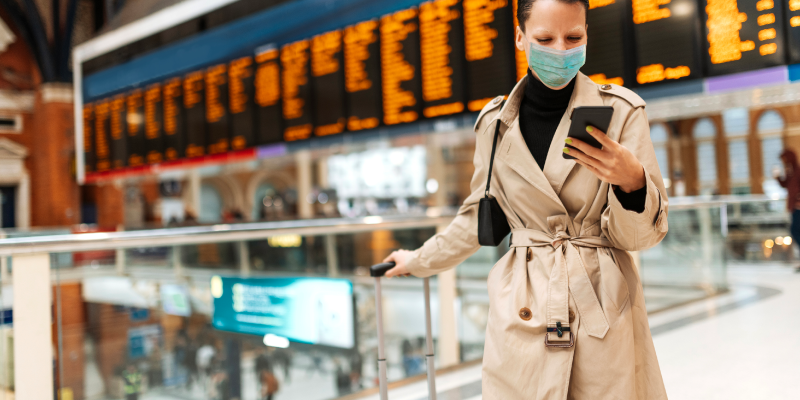- HOME
- Business travel
- The new normal: a glimpse into the future of business travel after COVID-19
The new normal: a glimpse into the future of business travel after COVID-19
A minute pathogen has turned the world topsy-turvy, especially the global business travel market. From an earlier prediction that business travel spend would top $1.7 trillion by 2022, GBTA is now predicting that the business travel industry will suffer a revenue loss of $820.7 billion.

Since companies have been directing their efforts towards adjusting to remote-work, business travel has come to a near standstill. However, these solutions aren’t advantageous for all businesses. Many firms have lost clients or contracts due to the lack of face-to-face meetings. In-person meetings provide unparalleled value, and they have always been better for building long-term trust and strong client relationships.
Once COVID-19’s intensity wanes and restrictions across the globe are eased, businesses will have to shift their focus from remote work to restarting corporate travel. When travel makes a comeback, you’ll need to be well-versed in the new normal for business travel, what it entails, and how it affects your employees.
Steady growth in domestic air travel
The travel industry will first see a resurgence in domestic business trips. According to Cirium, as of July, the demand for domestic travel has surged in the Asia-Pacific region, which now accounts for half of the top 20 markets. Business travelers will favor domestic travel over international travel owing to the lower cost, greater safety and ticket availability, international travel restrictions, and decreased risk.
Decreased international air travel
International travel, on the other hand, will see slower growth. By now you’re probably well aware of airlines downsizing and drastically cutting down their flights. Even as international travel revives, there will be fewer flights and most importantly, fewer direct flights. Business travelers will spend a substantial amount of time in transit waiting for their connecting flights. Furthermore, fewer flights equal fewer seats—which means air travel is set to become expensive due to limited availability. Airlines adhering to social distancing rules by leaving middle seats empty will only decrease the supply further. According to an estimate by Airline industry group IATA, leaving the middle seat vacant could potentially cause a spike of up to 54% in airfares.
Car rental and train travel demands will overtake air travel
As countries continue to grapple with the pandemic, car rental is garnering interest since it saves travelers from the crowds and risks of airplane rides. Knowing that the car is clean, thoroughly sanitised, and theirs alone for a few days puts business travelers at ease. This is a paradigm shift from travelers’ previous preference for ride-sharing apps.
The pandemic has also led to better appreciation for the railways. Business travelers in Europe are ready to swap planes for trains, especially those that offer sleeper service with individual cabins. This approach works well for Europe, since the rail network connects numerous prime business travel locations across the continent.
Greater emphasis on duty of care
Travel managers must be ready with a comprehensive duty of care program that combines the best practices with advanced technology to give travelers the safety they deserve. This includes being aware of the risk factors involved in the trip, knowing the traveler and their physical and mental health, how the tickets and accommodation have been booked, and who to contact in case of emergency (whether it’s the traveler’s kin or the person they are meeting with). Most importantly, travel managers need to have a bird’s-eye view of their travelers’ exact locations, technology to track them in real time, and streamlined communication channels to convey important alerts when needed.
Potential for new travel documents
Just as each country reached the peak of the pandemic at a different rate, the recovery rates will also differ, and individual governments will have the final say on permitting passengers in and out of their countries. International travelers will require medical certificates confirming that they have been tested and are free from the virus. If and when a vaccine comes into play, travelers may be required to provide proof of being vaccinated to curb the spread of the virus and ensure others’ safety.
Flexible booking policies
Airlines and hotels will rapidly adopt policies that business and leisure travelers have been asking for some time. Flexible travel booking, refund policies with reduced or no penalties for cancellation, and better customer support will be the basic expectations of passengers traveling after COVID-19. According to Skyscanner, this is an important consideration at present since the timelines imposed on travel restrictions are uncertain. If restrictions change suddenly, it’s important for passengers to have the flexibility to adjust their plans. To help with this, many airlines are now adopting flexible booking policies so that passengers can plan their trips now and remain unaffected by any later changes in travel restrictions.
Travel insurance is more important than ever
Travel insurance packages used to be considered add-ons during the booking process and often skipped. But since the onset of the pandemic, many travelers have lost out on non-refundable flights, accommodations, and deposits. Because of this, the travel industry is taking travel insurance more seriously and firms are requiring employees to obtain insurance under their new travel policies.
As the new normal comes to corporate travel, you will notice how mindful and well-thought-out business travel has become. It will increase slowly and steadily as firms will take their time in reviewing safety measures and re-evaluating policies to keep business travel going.